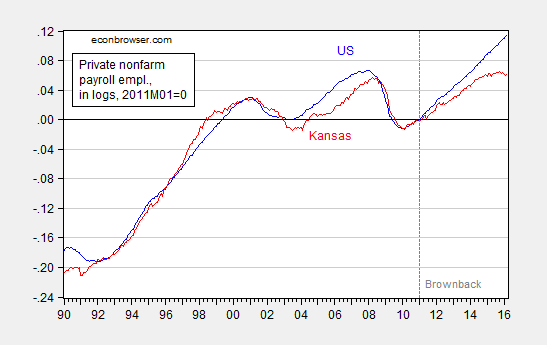In Governor Brownback’s re-election campaign, he committed to 25,000 new jobs per year in his next term. This is reminiscent of Governor Walker’s August 2013 promise to create 250,000 new private sector jobs over the four years of his first term, by January 2015. How are things going?
Kansas: “This other Eden, demi(Austrian)-paradise”
On reading my recent post on Kansas economic performance in the reign of Brownback, which included this graph:
Figure 1: Private nonfarm payroll employment in Kansas (red), in US (blue), in logs normalized to 2011M01=0. Dashed line at 2011M01, Brownback term begins. Source: BLS, author’s calculations.
A&M Professor/Extension Economist Levi Russell writes “Your analysis is highly flawed”.
Causes and consequences of the oil price decline of 2014-2015
At the NBER Annual Conference on Macroeconomics in Cambridge last week I participated with Steven Kamin of the Federal Reserve Board and Steven Strongin of Goldman Sachs in a discussion on commodity prices. You can watch a video of our discussion at the NBER web site.
Charles Wyplosz on the Eurozone Crises
“A Crisis that Should Not Have Happened”
“Kansas loses patience with Gov. Brownback’s tax cuts”
The experiment continues…
Thinking about The Great Leap Forward
When Technocrats Are Pushed Aside
A financial hockey stick
Yesterday I was at the 31st annual NBER conference on macroeconomics (along with fellow blogger Mark Thoma). Among the many interesting contributions was development of an extended data set on 25 different indicators for 17 advanced economies going back to 1870 by Jorda, Schularick and Taylor (2016).
Continue reading
Guest Contribution: “The Threat to US Global Leadership”
Today we are pleased to present a guest contribution written by Jeffrey Frankel, Harpel Professor of Capital Formation and Growth at Harvard University, and former Member of the Council of Economic Advisers, 1997-99. This is an extended version of a column that appeared in Project Syndicate.
Heckuva a Lot of Uncertainty There
The sheer audacity (and vagueness) of Senator Sanders’ economic program means that there is a lot of uncertainty surrounding impacts: wholesale replacement of ACA, rapid increases in marginal tax rates, rapidly escalating infrastructure spending, among others. Here’s CRFB’s estimate of the impact on debt-to-GDP.
Rich States, Poor States, 2016 Is Out
Arthur Laffer, Stephen Moore and Jonathan Williams strike again in this year’s installment of RSPS. According to their report, Utah’s prospects are the best, and Wisconsin’s outlook has risen to #9. Should the residents of these states rejoice?
